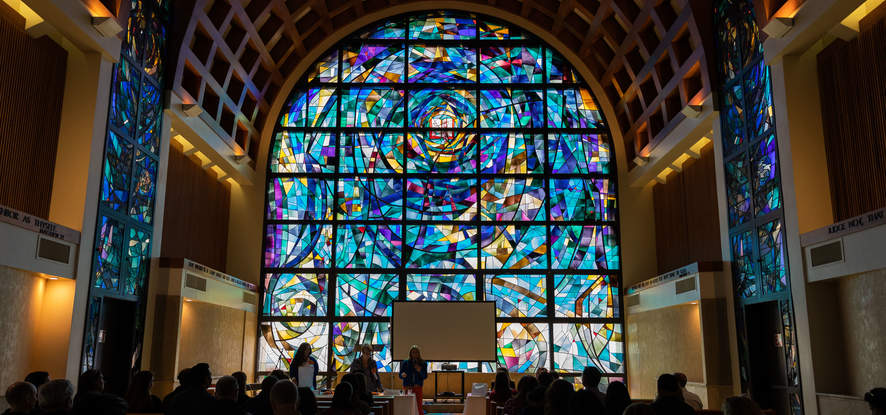A Place of Faith

"There are many good colleges and universities which can give you standard academic training," Pepperdine University's founder, George Pepperdine, once said, "but if our school does not give you more, than that it really has no reason to exist." On November 30, 1937, during the first semester of the school's existence, Mr. Pepperdine told the new students, "The great difference between this college and other colleges is that we are endeavoring to place adequate emphasis and greater stress upon religious teaching and Christian character." In his vision, however, students at Pepperdine would be free to accept or reject the Biblical teaching. He said that same day, "I want to present to you, in teaching and example, the Christian way of life. We do not compel you to accept it. You are free to make your own choice, but we want you to know what it is." Pepperdine University would be a place where students from all backgrounds could study and grow, and a place where Christian students could come and strengthen their faith. Since the school's beginning in the fall of 1937, it has striven to maintain the balance that its founder envisioned.
George Pepperdine was a life-long member of the Churches of Christ, and he wanted to found a school that would encourage the values of his faith. The Churches of Christ are nondenominational, Bible-based churches that seek to model the faith and practices of the New Testament Christians. Today, this group consists of over 13,000 autonomous churches made up of almost 1.3 million members throughout the United States. Pepperdine University is autonomous from the Church of Christ, however, it celebrates and cherishes its relationship with the church. George Pepperdine believed that the Christian faith's commitment to education, excellence, and humility would make a strong foundation for an institution of higher learning.
The current mission statement of the university states: "Pepperdine is a Christian university committed to the highest standards of academic excellence and Christian values, where students are strengthened for lives of purpose, service, and leadership." Through the class requirements and spiritual opportunities on campus, Pepperdine works to uphold the highest standards of Christian values.
Pepperdine students are required to take three religion classes as a part of the general education curriculum. The classes survey the Biblical texts, introduce students to critical methods of studying the Bible, review the histories of both the Israelite people and the early church, and challenge students to think deeply about the ways in which culture and religion have impacted one another. Students are also required to attend events from the Convocation series. These events include weekly, student body-wide gatherings in the Firestone Fieldhouse, daily chapels in Stauffer Chapel, and various lecture programs throughout campus. The Convocation series is dedicated to help students build Christian faith, affirm Christian values, and address the moral and ethical dimensions of current issues.
Pepperdine also offers students many additional opportunities for spiritual growth. Several area churches have strong campus ministry programs, including the University Church of Christ which meets on campus on Sunday mornings, and Waves Church which meets on campus on Sunday evenings. These campus ministries offer regular Bible studies and worship meetings, weekend retreats, mission trips, and social events. The university itself has a Student Ministries Office that facilitates spiritual activities on campus and a Spiritual Life Advisor program that places a student, spiritual advisor in each residence hall.
Pepperdine University believes that this commitment to Christian values enhances the academic environment on campus. In his book, How Christian Faith Can Sustain the Life of the Mind, Pepperdine professor Richard Hughes writes, "Precisely because I am a Christian scholar, I seek to nurture in my students a hunger and thirst for truth. Precisely because I am a Christian scholar, I encourage my students to critically assess not only the perspectives of others, but their own perspectives as well. And precisely because I am a Christian scholar, I encourage my students to approach their studies with imagination and creativity. The fact is, those who name the name of Christ can grow into first-class scholars and teachers, not in spite of our Christian commitments, but because of those commitments." This academic growth in a Christian environment is what Pepperdine wishes for all of its students.
The heritage of Churches of Christ has valued both free inquiry and an ecumenical spirit. This tradition—at its best—can sustain both openness to new and different ideas and the kind of diversity that Pepperdine seeks to nurture. This atmosphere, in which students are encouraged to explore faith and scholarship, is reflected in Pepperdine's affirmation statement, in which it says, "Truth has nothing to fear from investigation."